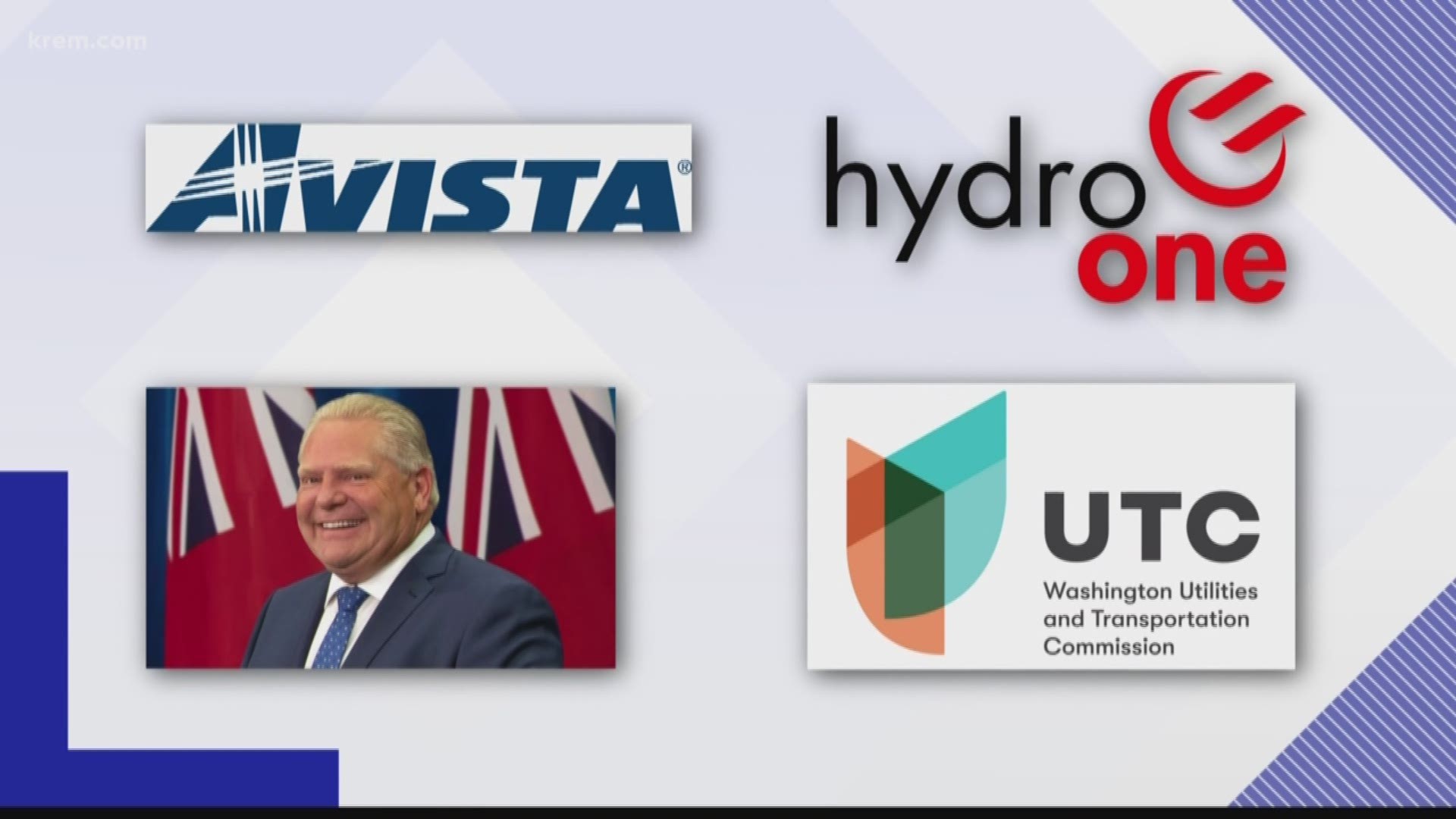SPOKANE, Wash. — Avista announced late Monday it would be appealing the decision from state regulators to reject a proposed merger between the company and Toronto-based Hydro One.
This is the latest development in a year-long saga that has a surprising amount to do with Canadian politics. Here’s a full breakdown of the key players and the timeline of events.
The players
For Inland Northwest residents, the most familiar player in this situation is Avista. The regional utility company is investor-owned, meaning it’s a private, for-profit company. That is actually pretty rare in the United States, where most utility organizations are run by the government.
The second key player is Hydro One, the corporation that wants to buy Avista. It’s also an investor-owned utility company, based in Toronto, Ontario. Unlike Avista, a vast amount of its shares are owned by one investor: the Province of Ontario government. This ownership stake is arguably the most important factor in the apparent downfall of this merger.
The third player involved is Doug Ford, who is a conservative politician in Ontario. If you feel like you recognize his name, that is because his late brother Rob gained international notoriety for his fiery spirit and cocaine use. Doug Ford leads the Progressive Conservative Party in Ontario. The party name may sound oxymoronic but the PC Party is the most powerful conservative party in Canada.
Finally, the Washington Utilities and Transportation Commission, or UTC, is also involved. This agency, among other charges, regulates utility companies like Avista. It’s a pretty powerful organization. The UTC can approve or reject mergers, and even restrict rate hikes.
The Timeline
In September 2017, Avista and HydroOne formally applied to merge. Specifically, HydroOne wants to buy Avista. Avista would keep its structure and name, but become a subsidiary.
Things were looking pretty good for the merger in March 2018. The companies meet with UTC staff and come to an agreement. They hash out a bunch of details, and propose ways to make sure ratepayers benefit from the merger, like providing rate credits. The baseline settlement contains more than 80 commitments to such ends. Not long after, the agreement is presented to the actual committee.
In the spring of 2018, the UTC commissioners voiced some concerns. Namely, the huge ownership stake Ontario has in Hydro One. Could it mean the whims and wishes of Canadian politicians could affect the future of Avista here in Washington?
The CEO of HydroOne assured the committee it wouldn't. He says the Province of Ontario had "been exemplary in their behavior in not involving themselves in the business of the organization."
In June 2018, Ontario had its provincial elections. The right-leaning PC Party gained a staggering 49 seats and took over the parliament. This is where Doug Ford comes in. Ford became the Premiere of Ontario and one of his campaign promises included ousting the entire board of HydroOne. And that is exactly what he does.
Within weeks of the election, the entire board and CEO of the company resign.
Shortly after, stock in Hydro One and Avista drops and Hydro One’s credit rating is downgraded.
In July 2018, this rings major alarm bells at the UTC. The commission had initially planned to deliver a decision in August. Following the election and subsequent turmoil, the commissioners decide to delay their deadline until December.
In October, the UTC held new hearings. The commissioners grilled both companies about the influence of the Ontario government. The commissioners ask the CEOs of Avista and Hydro One whether the CEOs believe Ford’s ouster of the board was in the best interest of those two companies. Both CEOs answer with a direct “no.”
On Dec. 5, The UTC announced it would be formally rejecting the merger, ruling that it "fails to provide a net benefit to Avista's customers.” They do not mince words, providing paragraphs of harsh assessment that basically boil down to: Ontario politics could too easily hurt Avista.
Without the go-ahead from the UTC, the acquisition is dead in the water. The companies have 10 days to petition for reconsideration.
On Monday, Avista and Hydro One announced they would appeal the decision and file that petition.
What Happens Next
First, the formal petition will be filed. Then, the commission has several options. The commissioners could decide to hear new arguments. They could choose to change their minds on the basis of the petition alone. They could choose to outright reject the petition. Lastly, they could ignore it and take no action, in which case their original decision will be cemented after 20 days.
We should know by the end of the week what the two companies will base their appeal on. Given the firm wording in the UTC's initial rejection, Avista and Hydro One's arguments will likely have to be fairly dramatic for anything to change.

